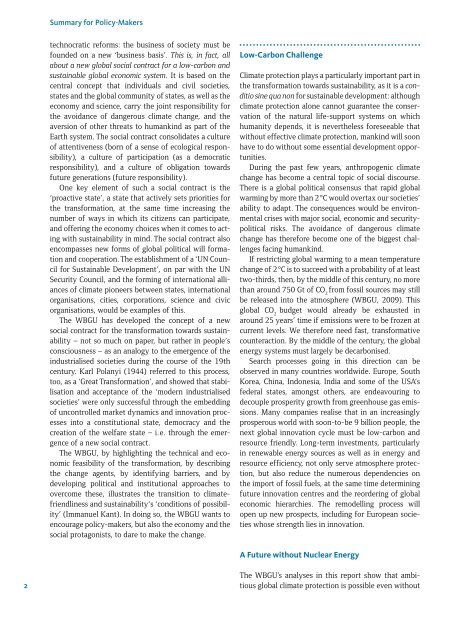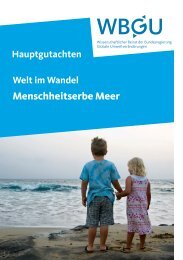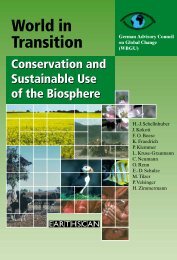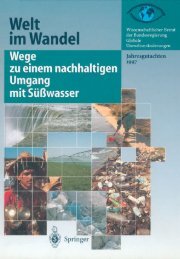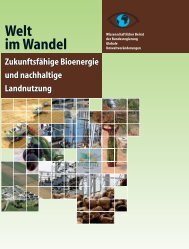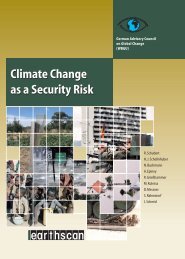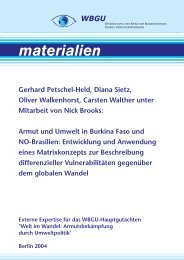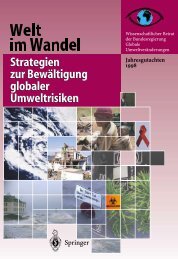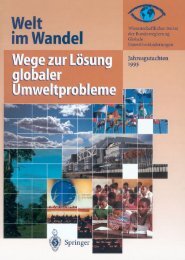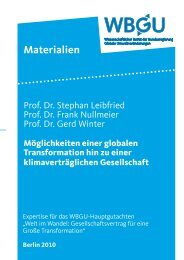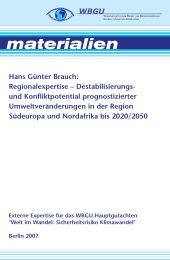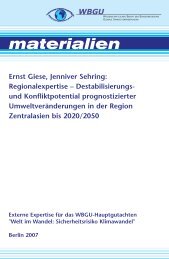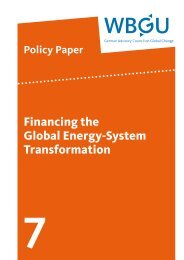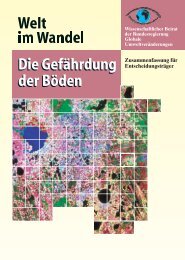World in Transition: A Social Contract for Sustainability - WBGU
World in Transition: A Social Contract for Sustainability - WBGU
World in Transition: A Social Contract for Sustainability - WBGU
You also want an ePaper? Increase the reach of your titles
YUMPU automatically turns print PDFs into web optimized ePapers that Google loves.
2<br />
Summary <strong>for</strong> Policy-Makers<br />
technocratic re<strong>for</strong>ms: the bus<strong>in</strong>ess of society must be<br />
founded on a new ‘bus<strong>in</strong>ess basis’. This is, <strong>in</strong> fact, all<br />
about a new global social contract <strong>for</strong> a low-carbon and<br />
susta<strong>in</strong>able global economic system. It is based on the<br />
central concept that <strong>in</strong>dividuals and civil societies,<br />
states and the global community of states, as well as the<br />
economy and science, carry the jo<strong>in</strong>t responsibility <strong>for</strong><br />
the avoidance of dangerous climate change, and the<br />
aversion of other threats to humank<strong>in</strong>d as part of the<br />
Earth system. The social contract consolidates a culture<br />
of attentiveness (born of a sense of ecological responsibility),<br />
a culture of participation (as a democratic<br />
responsibility), and a culture of obligation towards<br />
future generations (future responsibility).<br />
One key element of such a social contract is the<br />
‘proactive state’, a state that actively sets priorities <strong>for</strong><br />
the trans<strong>for</strong>mation, at the same time <strong>in</strong>creas<strong>in</strong>g the<br />
number of ways <strong>in</strong> which its citizens can participate,<br />
and offer<strong>in</strong>g the economy choices when it comes to act<strong>in</strong>g<br />
with susta<strong>in</strong>ability <strong>in</strong> m<strong>in</strong>d. The social contract also<br />
encompasses new <strong>for</strong>ms of global political will <strong>for</strong>mation<br />
and cooperation. The establishment of a ‘UN Council<br />
<strong>for</strong> Susta<strong>in</strong>able Development’, on par with the UN<br />
Security Council, and the <strong>for</strong>m<strong>in</strong>g of <strong>in</strong>ternational alliances<br />
of climate pioneers between states, <strong>in</strong>ternational<br />
organisations, cities, corporations, science and civic<br />
organisations, would be examples of this.<br />
The <strong>WBGU</strong> has developed the concept of a new<br />
social contract <strong>for</strong> the trans<strong>for</strong>mation towards susta<strong>in</strong>ability<br />
– not so much on paper, but rather <strong>in</strong> people‘s<br />
consciousness – as an analogy to the emergence of the<br />
<strong>in</strong>dustrialised societies dur<strong>in</strong>g the course of the 19th<br />
century. Karl Polanyi (1944) referred to this process,<br />
too, as a ‘Great Trans<strong>for</strong>mation’, and showed that stabilisation<br />
and acceptance of the ‘modern <strong>in</strong>dustrialised<br />
societies’ were only successful through the embedd<strong>in</strong>g<br />
of uncontrolled market dynamics and <strong>in</strong>novation processes<br />
<strong>in</strong>to a constitutional state, democracy and the<br />
creation of the welfare state – i. e. through the emergence<br />
of a new social contract.<br />
The <strong>WBGU</strong>, by highlight<strong>in</strong>g the technical and economic<br />
feasibility of the trans<strong>for</strong>mation, by describ<strong>in</strong>g<br />
the change agents, by identify<strong>in</strong>g barriers, and by<br />
develop<strong>in</strong>g political and <strong>in</strong>stitutional approaches to<br />
overcome these, illustrates the transition to climatefriendl<strong>in</strong>ess<br />
and susta<strong>in</strong>ability‘s ‘conditions of possibility’<br />
(Immanuel Kant). In do<strong>in</strong>g so, the <strong>WBGU</strong> wants to<br />
encourage policy-makers, but also the economy and the<br />
social protagonists, to dare to make the change.<br />
Low-Carbon Challenge<br />
Climate protection plays a particularly important part <strong>in</strong><br />
the trans<strong>for</strong>mation towards susta<strong>in</strong>ability, as it is a conditio<br />
s<strong>in</strong>e qua non <strong>for</strong> susta<strong>in</strong>able development: although<br />
climate protection alone cannot guarantee the conservation<br />
of the natural life-support systems on which<br />
humanity depends, it is nevertheless <strong>for</strong>eseeable that<br />
without effective climate protection, mank<strong>in</strong>d will soon<br />
have to do without some essential development opportunities.<br />
Dur<strong>in</strong>g the past few years, anthropogenic climate<br />
change has become a central topic of social discourse.<br />
There is a global political consensus that rapid global<br />
warm<strong>in</strong>g by more than 2 °C would overtax our societies’<br />
ability to adapt. The consequences would be environmental<br />
crises with major social, economic and securitypolitical<br />
risks. The avoidance of dangerous climate<br />
change has there<strong>for</strong>e become one of the biggest challenges<br />
fac<strong>in</strong>g humank<strong>in</strong>d.<br />
If restrict<strong>in</strong>g global warm<strong>in</strong>g to a mean temperature<br />
change of 2 °C is to succeed with a probability of at least<br />
two-thirds, then, by the middle of this century, no more<br />
than around 750 Gt of CO 2 from fossil sources may still<br />
be released <strong>in</strong>to the atmosphere (<strong>WBGU</strong>, 2009). This<br />
global CO 2 budget would already be exhausted <strong>in</strong><br />
around 25 years’ time if emissions were to be frozen at<br />
current levels. We there<strong>for</strong>e need fast, trans<strong>for</strong>mative<br />
counteraction. By the middle of the century, the global<br />
energy systems must largely be decarbonised.<br />
Search processes go<strong>in</strong>g <strong>in</strong> this direction can be<br />
observed <strong>in</strong> many countries worldwide. Europe, South<br />
Korea, Ch<strong>in</strong>a, Indonesia, India and some of the USA‘s<br />
federal states, amongst others, are endeavour<strong>in</strong>g to<br />
decouple prosperity growth from greenhouse gas emissions.<br />
Many companies realise that <strong>in</strong> an <strong>in</strong>creas<strong>in</strong>gly<br />
prosperous world with soon-to-be 9 billion people, the<br />
next global <strong>in</strong>novation cycle must be low-carbon and<br />
resource friendly. Long-term <strong>in</strong>vestments, particularly<br />
<strong>in</strong> renewable energy sources as well as <strong>in</strong> energy and<br />
resource efficiency, not only serve atmosphere protection,<br />
but also reduce the numerous dependencies on<br />
the import of fossil fuels, at the same time determ<strong>in</strong><strong>in</strong>g<br />
future <strong>in</strong>novation centres and the reorder<strong>in</strong>g of global<br />
economic hierarchies. The remodell<strong>in</strong>g process will<br />
open up new prospects, <strong>in</strong>clud<strong>in</strong>g <strong>for</strong> European societies<br />
whose strength lies <strong>in</strong> <strong>in</strong>novation.<br />
A Future without Nuclear Energy<br />
The <strong>WBGU</strong>’s analyses <strong>in</strong> this report show that ambitious<br />
global climate protection is possible even without


